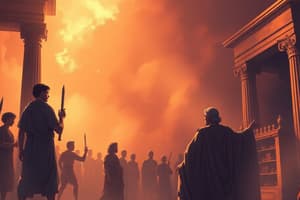Podcast
Questions and Answers
What were the two main types of drama created during the Greek Period?
What were the two main types of drama created during the Greek Period?
Which genre became popular during the Restoration Drama period?
Which genre became popular during the Restoration Drama period?
What was the primary purpose of drama during the Middle Ages?
What was the primary purpose of drama during the Middle Ages?
Who were the major dramatists associated with Elizabethan drama?
Who were the major dramatists associated with Elizabethan drama?
Signup and view all the answers
Which style of drama developed after World War II and depicted the horrors of war?
Which style of drama developed after World War II and depicted the horrors of war?
Signup and view all the answers
What is a characteristic feature of tragedy?
What is a characteristic feature of tragedy?
Signup and view all the answers
Which of the following is NOT a genre of tragedy?
Which of the following is NOT a genre of tragedy?
Signup and view all the answers
Existential drama primarily raises which of the following types of questions?
Existential drama primarily raises which of the following types of questions?
Signup and view all the answers
Which playwright is known for writing tragedies such as 'Hamlet' and 'Othello'?
Which playwright is known for writing tragedies such as 'Hamlet' and 'Othello'?
Signup and view all the answers
What defines the aim of comedy?
What defines the aim of comedy?
Signup and view all the answers
Study Notes
What is Drama?
- Drama is a fictional representation through dialogue and performance.
- It's a literary genre that imitates action, written for theatre, television, radio, and film.
- Drama is a composition in prose or verse, designed to be acted out.
- It portrays life using gestures, costumes, and scenery, often focusing on conflicts and emotions through dialogue and action.
History of Drama
1. Greek Period
- Ancient Greeks (500 B.C.) created drama, dividing it into tragedy and comedy.
- Famous playwrights include Aeschylus, Sophocles, Euripides, and Aristophanes.
- Greek plays were performed outdoors in amphitheatres, using stage devices like trap doors, a chorus, and masks.
2. Middle Ages
- During the Middle Ages (7th to 15th century), the Catholic Church used drama to tell Bible stories.
- This included Mystery Plays (Bible stories), Miracle Plays (stories of saints), and Morality Plays (stories of morals and good conduct).
3. Elizabethan Period
- In the Elizabethan era (16th century), drama emerged in theatres.
- William Shakespeare and Christopher Marlowe were prominent dramatists.
- Women were not allowed to act, so men played female roles.
4. Restoration Period
- The Restoration period (17th to 18th centuries) saw the reopening of theatres after the restoration of Charles II.
- Drama reflected the weaknesses of court morals through satire, farce, and comedy.
- "Comedy of Manners" became a popular genre during this time, with dramatists like John Dryden and William Congreve.
5. Victorian Period
- Victorian Theatre (19th century), ruled by Queen Victoria (1837-1901), presented plays related to social issues, like working-class, labor, women's, and children's problems, and education.
- Dramatists like George Bernard Shaw, John M. Synge, and Oscar Wilde were prominent figures in this era.
6. 20th Century (Modern)
- After World War II, new dramatic styles emerged.
- "Theatre of the Absurd" highlighted war's horrors (Samuel Beckett, Eugène Ionesco, and Harold Pinter).
- "Angry Young Men" plays focused on working-class and lower-middle-class issues.
- Existential drama explored philosophical and spiritual questions about life, existence, freedom, and death.
Tragedy and Comedy
Tragedy
- Tragedy is a story with a sad ending.
- The protagonist usually meets with disaster, either through their fault or unavoidable circumstances.
- Tragic plays evoke pity and fear from the audience and feature a noble and powerful protagonist.
- Greek, revenge, domestic, bourgeois, and Shakespearean are types of tragedy.
- Key examples include Hamlet, King Lear, Macbeth, and others.
Comedy
- Comedy aims to amuse and entertain a reader by creating laughter and pleasure.
- Comedies often depict funny situations with positive outcomes.
- Comedies aim to highlight human follies and foolishness.
- Popular genres include farce, melodrama, and musical drama.
Studying That Suits You
Use AI to generate personalized quizzes and flashcards to suit your learning preferences.
Related Documents
Description
This quiz explores the fundamental concepts of drama, including its definition as a literary genre and its evolution through different historical periods. From the origins in Ancient Greece to the influence of the Middle Ages and beyond, discover how drama has shaped storytelling in theatre and performance.




